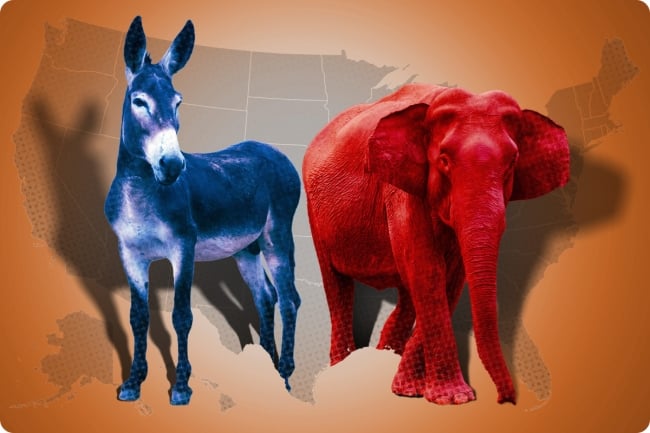You have /5 articles left.
Sign up for a free account or log in.

A recent survey reinforces the fact that the political climate of a state can impact whether prospective students decide to enroll at colleges there.
Photo illustration by Justin Morrison/Inside Higher Ed | acambium64/iStock/Getty Images | FUTURE KIIID/pexels
From the rise of artificial intelligence in college classrooms to the rapid politicization of campus life, higher education has changed dramatically in just the past few years. So have the ways prospective students choose their future alma maters, according to a new report from enrollment management consulting firm EAB.
The report, which draws from three recent surveys of roughly 40,000 high school and first-year college students, found that students’ priorities in choosing which colleges to apply to are evolving, as are the best practices for reaching and recruiting them.
The surveys showed that a growing number of students consider politics when deciding where to apply. In fact, politics has become such a prominent piece of the application puzzle that EAB asked students about it for the first time this year.
Twenty-nine percent of prospective students said they removed at least one college from their list because of the perceived politics of the campus, and 16 percent did so because of the policies of the state where that college is located, according to the EAB report. Fourteen percent of respondents said they removed a college from consideration because they believed it was too conservative, and 8 percent did the same because they saw it as overly liberal.
Those results echo another survey released by Art & Science Group in October, which found that 28 percent of students considered politics in their college search process. And hot-button state politics issues, like reproductive rights and gun control laws, were a factor in nearly 80 percent of applicants’ decisions in 2023–24, according to a March report from Gallup and the Lumina Foundation.
But the EAB report shows that as the political limelight shines brighter on higher education, the role of politics in the application process has only grown more prominent.
Pam Royall, EAB’s head of research and a co-author of the report, said the firm put the political question on its surveys for the first time this year after a growing number of student respondents self-inserted answers about the role of politics in their college decision-making. That began in 2020, she said, after the varied college responses to the COVID-19 pandemic set off a firestorm of debate over the safest ways to contain the virus on campus.
Since then, as higher education has become politicized at both the federal and state levels, students’ thinking about their future education has taken on a more political bent, too—and thus, so has EAB’s survey, she said.
“We have evolved our method to allow for these kinds of responses, which weren’t as prevalent five years ago,” she said. “We have done work for schools that are located in Florida, and there are kids that say they’re going because it’s in Florida or Texas, or that they’re not going because it’s in Florida.”
But for all their focus on politics, by far the most common reason for students to remove a college from their shortlist was accessibility: 71 percent said they removed an institution from their list because it was too expensive, and 47 percent said they did so because it was too far from home.
AI and DEI at the Forefront
The report also highlighted the surging popularity of artificial intelligence in helping students navigate the college search and application process. Ten years ago, Royall said, most students got their information from institutions’ websites; now, nearly half get it from AI chat bots. Some AI college counseling tools saw more than 300 percent growth in their user base. But while AI is increasingly popular, it is also viewed as one of the least reliable sources for information on colleges: only 3 percent of respondents said they find the information trustworthy.
Royall said that AI has become semi-ubiquitous in college recruiting and outreach, but that it’s too soon to tell whether that’s a good thing, especially as AI tools and search engine summaries frequently return false or hallucinated responses.
“I’m concerned, because verifying that the information students are getting is so difficult,” she said. “If you ask me a year from now, I’ll say I’m more confident in it. Right now, I’m not.”
Students also strongly consider their projected sense of belonging, emotional well-being and safety on campuses in making their college decisions. And as institutions shut down DEI offices due to changes in state and federal policy, and student protesters are arrested and suspended or expelled, a growing number of prospective students said that “safety” and “well-being” include campus commitments to both diversity, at 53 percent of respondents, and free expression, at 35 percent.
Even as students prioritize belonging, institutions have begun walking back their commitments to diversity outreach and campus affinity groups due to the Trump administration’s anti-DEI directives. Royall said those DEI rollbacks have prompted a reckoning within the enrollment management world—and that the survey results illustrate that students want the benefits of diversity outreach even if it comes in a different form.
“Very few institutions are going to have the stamina or resources to be defiant,” she said. “So we’re going to be challenged to think about this very differently because of the threat.”





